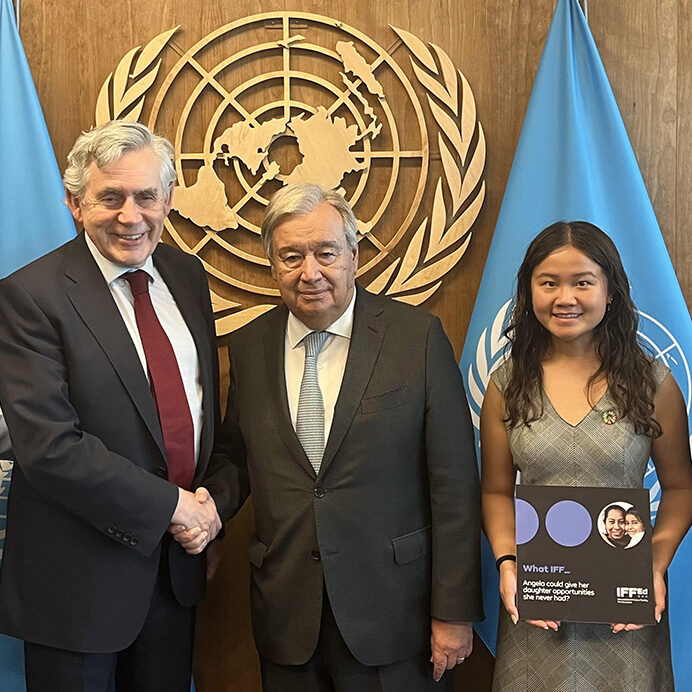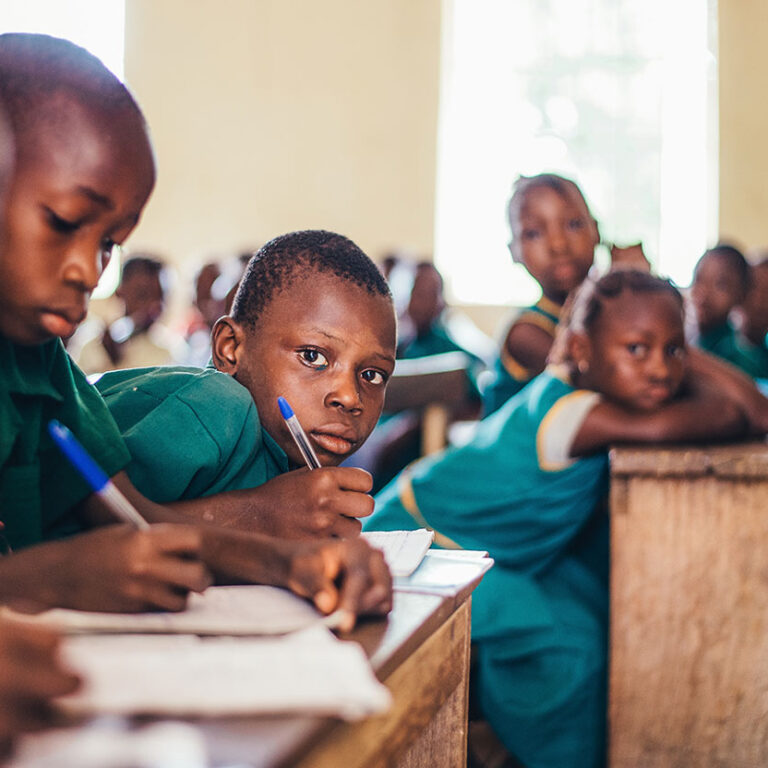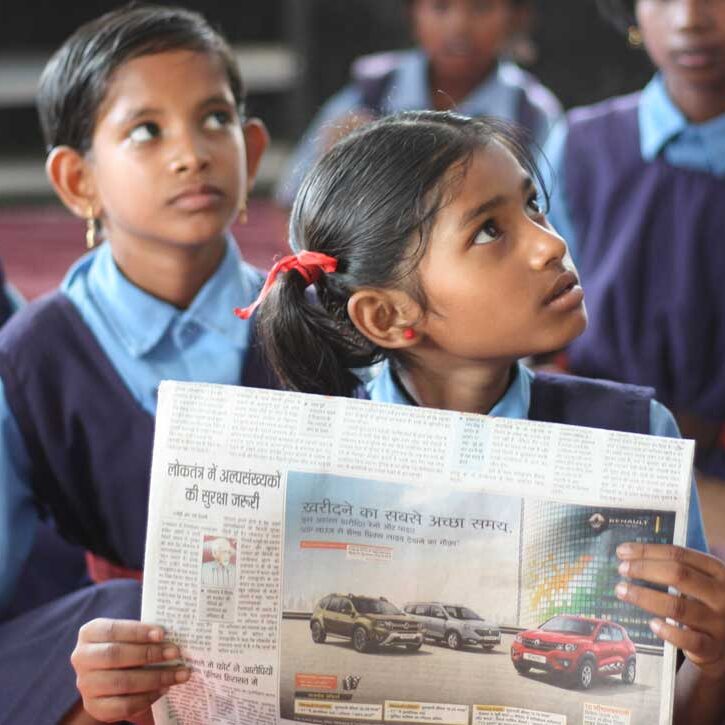Transforming Education
Global Education is in crisis. Today nearly 300 million children don’t go to school, more than 80% of whom are found in low-income countries, and 800 million young people will leave school without any qualifications. Recent data shows that global learning poverty in low- and middle-income countries is estimated to have risen to 70%, with more than half of the world’s children unable to read or write a simple text at the age of 10 and no accredited skills for the workplace when they leave school. Coupled with the ‘violation’ of children’s right to education evidenced by these high levels of learning poverty, the latter is bound to have a devastating impact on future productivity, earnings, and well-being for this generation of children and youth, their families, and the world’s economy.
This failure to deliver an inclusive and equitable, academic, and vocational quality education to all puts us at grave risk of not achieving the laudable aims of Sustainable Development Goal (SDG) 4 and of the many other SDGs dependent or reliant on it. It also means we are only providing for half of our future.
Education budgets in low- and lower-middle-income countries will have to more than double to $3 trillion by 2030 if we are to achieve SDG 4 and universal access to quality education. Without action, the loss in lifetime earnings of the current generation of school-age children and youth due to shortcomings in education investment is estimated to amount to more than 15% of today’s global GDP ($21 trillion). This economic cost will be disproportionately borne by low- and middle-income countries and this generation of their students, further aggravating already serious intergenerational inequalities and divides, as well as gaps and divides between and within countries.
In spite of this recognised demand for investment, countries across the globe have had to cope with the financial pressures of the COVID-19 pandemic, now compounded by the food, energy, debt, and currency crises triggered and exacerbated by the war in Ukraine, making education compete for the limited resources governments have available. But the reduction in education spending is particularly paradoxical since an educated and skilled workforce is central to escaping poverty, eliminating the gender and wealth disparities that continue to plague our societies, and to achieving economic recovery and growth. While the internationally recommended level of spending on education is at least 4% of GDP, the majority of the world’s 82 low- and lower-middle income countries continue to spend less, in some cases less than 2% of GDP.
And sadly, despite promises being made, the development aid rich countries currently channel to education has been falling too – from 8.5% in 2010 to just 6.6% in 2020. Today, even when all the world’s education aid is combined, including that from bilateral and multilateral sources, it amounts to just $18 per African child, hardly enough to pay for a textbook, far less a teacher or a classroom.
UN Secretary-General António Guterres will convene the Transforming Education Summit which will be taking place in New York this September. With COVID-19 waning, and in light of the complexity of converging crises, we must now seriously get into building back better mode and address the enormous challenge of access to education for all, upon which much of our future will depend. Without addressing the persistent exclusion of minorities, migrants, refugees and other marginalised groups in our education systems, the entrenchment of existing inequalities within societies will only grow deeper and we will fail to achieve inclusive, peaceful and sustained development.
Modernisation of education systems through better training and rewards for teachers, the application of new technologies and digital learning and new pathways for skills training will make an important difference on the outcomes we are able to achieve – but so will money. One proposal now being considered is for a Compact for Global Education between developing countries and the developed economies that provide donor aid.
Through such a Compact, countries would agree to raise education spending in stages to at least 4-6% of their national income, over a period of five years, and invest at least 15% and hopefully 20% of all their public spending in education.
Sustainable funding for education can be increased through domestic action to reform national tax systems, coupled with international action to cut tax loopholes and illicit financial flow. Implementing taxation reforms that support equity and redistribution can address critical poverty and inequality concerns in many low- and middle-income countries.
In parallel, multilateral institutions can offer enhanced support in order to encourage the fast-tracking of educational opportunities.
The World Bank’s low-income facility – the International Development Association (IDA) ¬– could raise its spending on education from 10% to 15%, leveraging new resources from donors and an enhanced use of its reflows – the capital returned from past loans – to fund this enhanced spending. Larger support for schools and teachers in the developing world alone would unlock education opportunities for more than 20 million children every year in the poorest countries.
The biggest number of out-of-school children are located in lower-middle-income countries, home to 700 million children. In turn, these countries are today hosting a high share of the world’s refugees and displaced young people. The International Bank for Reconstruction and Development (IBRD), the World Bank Group’s middle-income country facility, however, currently allocates just 5% of its loans to education in lower-middle-income countries, down from an already very low 6% in 2010.
IDA and IBRD funding could be complemented through a revival of the International Finance Facility for Education put forth several years ago by the Education Commission in The Learning Generation report. This Facility would fund education programs in low- and lower-middle-income countries at low-interest rates, akin to that of IDA’s credits, using guarantees backed by grants from donor countries through the various multilateral development banks.
Such funding would be additional to bilateral aid from Development Assistance Committee (DAC) donors who would commit to higher Official Development Assistance (ODA) levels, with a greater amount of the latter channeled through international and multilateral institutions, including UNESCO, UNICEF, and other UN agencies, and through educational initiatives such as the Global Partnership for Education and Education Cannot Wait. Funding could be further enhanced by a call for greater and more innovative social impact investment in education through cross-border individual and corporate philanthropy in the sector.
Over the next five years, this plan could produce an extra $10 billion of new educational funds for low-income countries, and yet another $10 billion in additional resources for middle-income countries.
UN Secretary-General António Guterres in the 2021 Our Common Agenda report, identified the need for a second World Social Summit in 2025. This event could serve as a critical platform to support better coordination and more innovative responses for catalysing the type of initiatives needed to transform the education sector globally.
We are so far away from our goal of universal education by 2030 that unless we act quickly and generously we will fall further behind on our SDG 4 commitment to “ensure inclusive and equitable quality education and promote lifelong learning opportunities for all.” We, therefore, call on countries to support these bold measures.
We can be the first generation in history where every child goes to school. Instead of developing some of the potential for some children in some countries, we can develop the potential for all children in all countries, but we have to act. To achieve this, we urge all countries in the UN family to support this initiative at the summit on 19th September.
Signatories
- Philippe Aghion – Professor of Economics, Collège de France & London School of Economics (LSE)
- María Elena Agüero – Secretary General of the WLA-Club de Madrid
- Bertie Ahern – Taoiseach of the Republic of Ireland (1997-2008)
- Hamid Ansari – Vice President of India (2007-2017)
- Shaukat Aziz – Prime Minister of Pakistan (2004-2007)
- Jan Peter Balkenende – Prime Minister of the Netherlands (2002-2010)
- HE Joyce Banda – President of Malawi (2012-2014), Chair of Human Capital Africa
- Professor Oriana Bandiera – Director of STICERD & Professor of Economics, LSE
- Kaushik Basu – President of the International Economic Association; Chief Economist of the World Bank (2012-2016)
- Professor Erik Berglöf – Director of the Institute of Global Affairs, London School of Economics; Chief Economist of the EBRD (2006-2014)
- Sali Berisha – President of Albania (1992-1997); Prime Minister (2005-2013)
- Ana Birchall – Prime Minister of Romania (2016-2019)
- Dr Mario Blejer – Governor of the Central Bank of Argentina (2002); Director of the Centre for Central Banking Studies, Bank of England (2003-2008)
- Patrick Bolton – Professor of Finance and Economics, Imperial College London; Professor, Columbia University
- Dumitru Braghiș – Prime Minister of Moldova (1999-2001)
- Lakhdar Brahimi – Minister of Foreign Affairs of the Republic of Algeria (1991-1993); UN & Arab League Envoy to Syria (2012-2014); Member of The Elders
- Gordon Brown – Prime Minister of the United Kingdom (2007-2010)
- Robin Burgess – Professor of Economics, LSE
- Fernando Henrique Cardoso – President of Brazil (1995-2003)
- Wendy Carlin – Professor of Economics, University College London
- Hikmet Çetin – Minister of Foreign Affairs of Turkey (1991-1994), Speaker of the Grand National Assembly (1997-1999)
- Baroness Lynda Chalker – Minister of Overseas Development of the United Kingdom (1989-1997)
- Laura Chinchilla – President of Costa Rica (2010-2014), Vice President of Club de Madrid
- Professor Bai Chong-En – Dean, Tsinghua School of Economics and Management, Tsinghua University
- Helen Clark – Prime Minister of New Zealand (1999-2008); UNDP Administrator (2009-2017)
- Joe Clark – Prime Minister of Canada (1979-1980)
- Emil Constantinescu – President of Romania (1996-2000)
- Chester Crocker – Assistant Secretary of State for African Affairs, United States (1981-1989)
- Mirko Cvetković – Prime Minister of Serbia (2008-2012)
- Marzuki Darusman – Attorney General of Indonesia (1999-2001)
- Mathias Dewatripont – Professor of Economics, Université libre de Bruxelles
- Beatrice Weder di Mauro – President, Centre for Economic Policy Research (CEPR); Professor of International Economics, Graduate Institute in Geneva
- Philip Dimitrov – Prime Minister of Bulgaria (1991-1992)
- Elena Duro – Secretary of Educational Evaluation, Ministry of Education, Argentina (2016-2019)
- Dr Victor J. Dzau – President of the National Academy of Medicine
- Barry Eichengreen – Professor of Economics and Political Science, University of California, Berkeley
- María Fernanda Espinosa – President of the UN General Assembly (2018-2019); Minister of Foreign Affairs of Ecuador (2007; 2017-2018) & Minister of Defence (2012-2014)
- Gareth Evans – Foreign Minister of Australia (1988-1996); President and CEO of International Crisis Group (2000-2009)
- Jan Fischer – Prime Minister of the Czech Republic (2009-2010); Finance Minister (2013-2014)
- Louise Fréchette – UN Deputy Secretary-General (1998-2006)
- Eduardo Frei Ruiz-Tagle – President of Chile (1994-2000)
- Chiril Gaburici – Prime Minister of Moldova (2015); Minister of Economy and Infrastructure (2018-2019)
- Ahmed Galal – Finance Minister of Egypt (2013-2014)
- Dr Lawrence Gonzi – Prime Minister of Malta (2004-2013)
- Dalia Grybauskaitė – President of the Republic of Lithuania (2009-2019)
- Ameenah Gurib-Fakim – President of Mauritius (2015-2018)
- Sergei Guriev – Chief Economist of the EBRD (2016-2019); Professor of Economics, Sciences Po
- Ángel Gurría – Secretary General of the OECD (2006-2021)
- Alfred Gusenbauer – Chancellor of Austria (2000-2008)
- Tarja Halonen – President of Finland (2000-2012)
- Dr Han Seung-soo – Prime Minister of South Korea (2008-2009)
- Hilda Heine – President of the Marshall Islands (2016-2020)
- Bengt Holmström – Nobel Laureate for Economics (2016); Professor of Economics, MIT
- Ekmeleddin İhsanoğlu – Secretary General of the Organization of Islamic Cooperation (2004-2014)
- Dalia Itzik – Interim President of Israel (2007); President of the Knesset (2006-2009)
- Mladen Ivanić – Member of the Presidency of Bosnia and Herzegovina (2014-2018)
- Harold James – Professor of European Studies & Professor of History and International Affairs, Princeton University
- Mehdi Jomaa – Prime Minister of the Republic of Tunisia (2014)
- T. Anthony Jones – Vice-President and Executive Director of the Gorbachev Foundation of North America
- Dr Lee Jong-Wha – Professor of Economics, Korea University; Chief Economist & Head of the Office of Regional Economic Integration at the Asian Development Bank (2007-2013)
- Ivo Josipović – President of Croatia (2010-2015)
- Mats Karlsson – Vice President, External Affairs at the World Bank (1999-2002)
- Ban Ki-moon – UN Secretary General (2007-2016); Deputy Chair of The Elders
- Jadranka Kosor – Prime Minister of Croatia (2009-2011)
- Leonid Kuchma – President of Ukraine (1994-2005)
- Aleksander Kwaśniewski – President of Poland (1995-2005)
- Luis Alberto Lacalle Herrera – President of Uruguay (1990-1995)
- Zlatko Lagumdzija – Prime Minister of Bosnia and Herzegovina (2001- 2002); Foreign Affairs Minister (2012-2015)
- Professor Justin Yifu Lin – Chief Economist & Senior Vice-President of the World Bank (2008-2012); Dean of Institute of New Structural Economics, Peking University
- Tzipi Livni – Vice Prime Minister & Minister of Foreign Affairs of Israel (2006-2009); Minister of Justice (2013-2014)
- Petru Lucinschi – President of Moldova (1997-2001)
- Igor Luksic – Prime Minister of Montenegro (2010-2012)
- Ricardo Luna – Minister of Foreign Affairs of Peru (2016-2018)
- Nora Lustig – President Emeritus of the Latin American and Caribbean Economic Association; Professor of Latin American Economics, Tulane University
- Cristina Manzano – Director of esglobal and Representative of Founding Constituent Member FRIDE
- Moussa Mara – Prime Minister of Mali (2014-2015)
- Giorgi Margvelashvili – President of Georgia (2013-2018)
- Dr Dalia Marin – Professor Emeritus, University of Munich
- Colin Mayer CBE – Professor of Management Studies, Saïd Business School, University of Oxford
- Péter Medgyessy – Prime Minister of Hungary (2002-2004)
- Rexhep Meidani – President of Albania (1997-2002)
- Stjepan Mesić – President of Croatia (2000-2010)
- James Michel – President of the Seychelles (2004-2016)
- Dr Amre Moussa – Secretary General of the Arab League (2001-2011); Minister of Foreign Affairs of Egypt (1991-2001); Board Member of NGIC
- Rovshan Muradov – Secretary General of NGIC
- Mustapha Kamel Nabli – Governor of the Central Bank of Tunisia (2011-2012)
- Piroska Nagy-Mohácsi – Programme Director of the Institute of Global Affairs, LSE; Director of Policy, EBRD (2009-2015)
- Chief Olusegun Obasanjo – President of the Federal Republic of Nigeria (1999-2007)
- Lord Jim O’Neill – Chair of Chatham House
- Djoomart Otorbaev – Prime Minister of Kyrgyzstan (2014-2015)
- Anand Panyarachun – Prime Minister of Thailand (1991-1992)
- Georgi Parvanov – President of Bulgaria (2002-2012)
- Andrés Pastrana – President of Colombia (1998-2002)
- P. J. Patterson – Prime Minister of Jamaica (1992-2006)
- Q. Ambassador Thomas R. Pickering – United States Under Secretary of State for Political Affairs (1997-2000); Ambassador to the UN (1989-1992)
- Sir Christopher Pissarides – Nobel Laureate for Economics (2010); Professor of Economics & Political Science, LSE
- Rosen Plevneliev – President of Bulgaria (2012-2017)
- Richard Portes CBE – Professor of Economics, London Business School; Founder and Honorary President of the Centre for Economic Policy Research
- Marie-Louise Coleiro Preca – President of Malta (2014-2019)
- Jorge Quiroga – President of Bolivia (2001-2002)
- Iveta Radičová – Prime Minister of Slovakia (2010-2012)
- Hélène Rey – Professor of Economics, London Business School
- José Luis Rodríguez Zapatero – Prime Minister of Spain (2004-2011)
- Gérard Roland – Professor of Economics & Professor of Political Science, University of California, Berkeley
- Petre Roman – Prime Minister of Romania (1989-1991)
- Professor Jeffrey D. Sachs – Director of the Center for Sustainable Development, Columbia University
- Mirko Sarovic – President of Bosnia and Herzegovina (2002-2003), Deputy Prime Minister (2015-2019)
- Ismail Serageldin – Vice President of the World Bank (1992-2000); Co-Chair of NGIC
- Rosalía Arteaga Serrano – President of Ecuador (1997)
- Javier Solana – Secretary General of the Council of the EU (1999-2009); Secretary General of NATO (1995-1999)
- Devi Sridhar – Professor of Global Public Health, University of Edinburgh
- Dr Eduardo Stein – Vice President of Guatemala (2004-2008)
- Petar Stoyanov – President of Bulgaria (1997-2002)
- Laimdota Straujuma – Prime Minister of Latvia (2014-2016)
- Boris Tadić – President of Serbia (2004-2012)
- Jigme Y. Thinley – Prime Minister of Bhutan (2008-2013)
- Danilo Türk – President of Slovenia (2007-2012); President of WLA-Club de Madrid
- Cassam Uteem – President of Mauritius (1992-2002); Vice-President of WLA-Club de Madrid
- Raimonds Vejonis – President of Latvia (2015-2019)
- Vaira Vike-Freiberga – President of Latvia (1999-2007); Co-Chair of NGIC
- Ernst-Ludwig von Thadden – President, Mannheim University (2012-2019); Professor, Economics Department
- Filip Vujanović – President of Montenegro (2003-2018)
- Leonard Wantchekon – Founder & President of the African School of Economics; Professor of Politics and International Affairs, Princeton University
- Shang-Jin Wei – Chief Economist of the Asian Development Bank (2014-2016); Professor of Chinese Business and Economy & Finance and Economics, Columbia Business School
- Kateryna Yushchenko – First Lady of Ukraine (2005-2010); Board Member of NGIC
- Viktor Yushchenko – President of Ukraine (2005-2010)
- Valdis Zatlers – President of Latvia (2007-2011)



